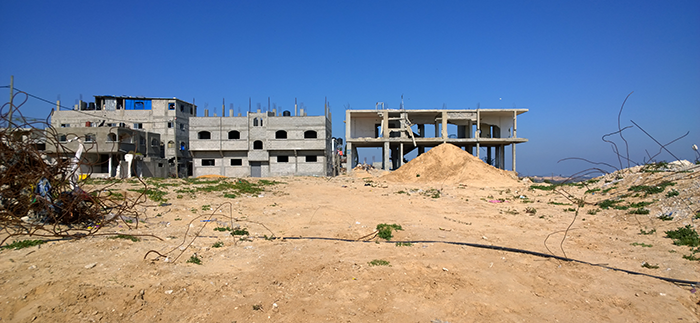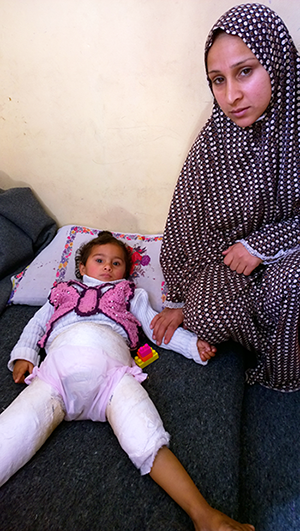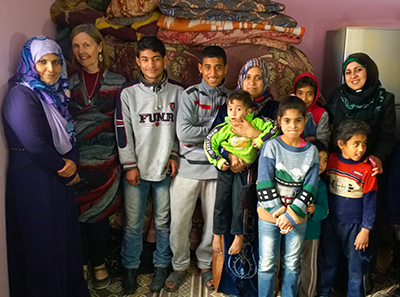ABM Archive Website
THIS WEBSITE CONTAINS ARCHIVE MATERIALS FOR HISTORICAL REFERENCE ONLY
For up-to-date information, including our latest appeals, news, and resources, please visit our current website.
Holy Land: Al-Ahli Hospital update
 |
| Buildings destroyed in the July 2014 conflict between Hamas and Israel litter the landscape in Gaza |
SEPTEMBER 2016
ABM Programs Director, Dr Julianne Stewart, made a visit to our partner in the Gaza Strip earlier this year. She travelled around some of the communities which participate in the Child Nutrition program run by ABM’s partner, the Al Ahli Hospital (a medical facility of the Anglican Diocese of Jerusalem), and met some of the parents and children who are benefiting from this assistance. Here is her story.
“Beit Hanoun is a poor area of Gaza, near the Israeli border. People there were very hard hit by the August 2014 bombing by the Israeli Defence Force. I accompanied the Al Ahli Hospital Social Worker, Mohammad Ali Naqa, and two community social worker volunteers, Fathiya and Hanin and other members of the community-based organisation (CBO), Association of the Friends of Jabalia, to Beit Hanoun. This CBO, as with all the CBOs with whom the Ahli works, is registered with the government, and has 11 members. It works with about 200 families, targeting three areas in Beit Hanoun.
 |
| Manal and her daughter in splints |
We met various families who had had a young child go through the Ahli’s Child Nutrition program. The first person we met was Manal. She lives in a container erected after the August 2014 bombing, and shared this with another family, since her home had been hit by the bombs. Her little 2 year old girl was wearing splints on her legs and lying in a makeshift bed on the floor of one of the two rooms that were occupied by two families.
Manal said, “I really thank the Ahli Hospital, for giving her support. But I stopped taking my daughter there due to the 10 Shekel cost of getting to the hospital is too much. My daughter is still underweight.” This was surprising to hear, and I wondered how or whether ABM could help with this problem.
A camp stove was on the floor of the other room, and Fathiya commented that many children have been brought to the hospital for burns since the war, as many families now have similar stoves which are easily tripped over by children. Two of the older sons of the family were mentally disabled, and one of them had to be restrained, to keep him safe from wandering away.
We moved to another house, this time to meet with 3 year old Abdullah who completed the program and is doing well, according to the social workers and his mother. Hyat is 34 years old and has nine children under 18, and Abdullah is the youngest. She says, “Abdullah is doing well. I thank God he has improved. We give him his vitamins, enhanced milk, and food parcels from the Ahli. He is 12kg now.” Abdullah’s father is unemployed, and struggles to feed his family. The CBO members say that being underweight shouldn’t be the only criterion for entering the program. Many children are anaemic, since the most common meal for poor women and children is bread and tea. Both Fathiya and Hanin do regular follow-ups with the children in Beit Hanoun.
 |
|
Hyat holds her son Abdullah as she poses with the rest of her family, |
200 at-risk families in three parts of Beit Hanoun potentially have access to the Ahli Child Nutrition Program and other outreach programs via their local community-based organisations. These organisations and local Social workers discuss cases and recommend at risk children to the program via the Ahli Social Worker, Mohammad. The children and their mothers then travel by bus to the hospital to get their children assessed by the Paediatrician, and put on the Child Nutrition Program if eligible (according to various indicators of malnutrition). Once on the program, mothers are counselled about nutrition, both for themselves and their families.
All families are grateful for the program. Many mothers were shy when speaking to me, but their concern or happiness comes across in their facial expressions and gestures. One mother, Tahreer, said her little 2 year old boy had improved a little after completing the program. She would like him to go for a second round of treatment so that he could continue to improve. Suhaila Tarazi, the Hospital Director, commented on this: “Mothers always want more for their children. If children are making progress, and still need more supplements, they can stay in the program for a further three months.”
I felt privileged to meet these families, and was touched by their kindness and determination in the midst of such hardships. The importance of this Child Nutrition program, not only for the vital supplements it provides to needy children, but also in the support given to mothers in health education, cannot be under-estimated. It is indeed expressing the love of Christ to those who need it the most.
ABM would like to sincerely thank everyone who has given to the Al Ahli Hospital Child Nutrition program. We are proud to announce that we are extending support in this new financial year, allowing many more children to access this vital care.
< Back


